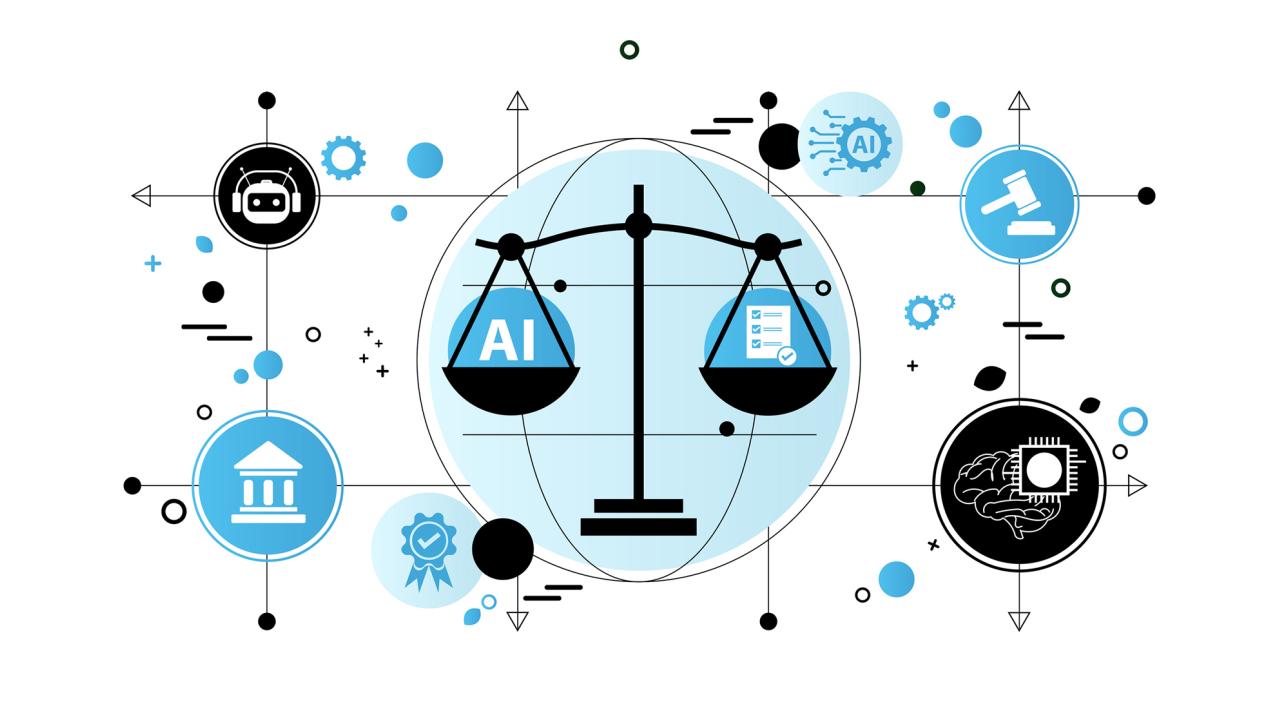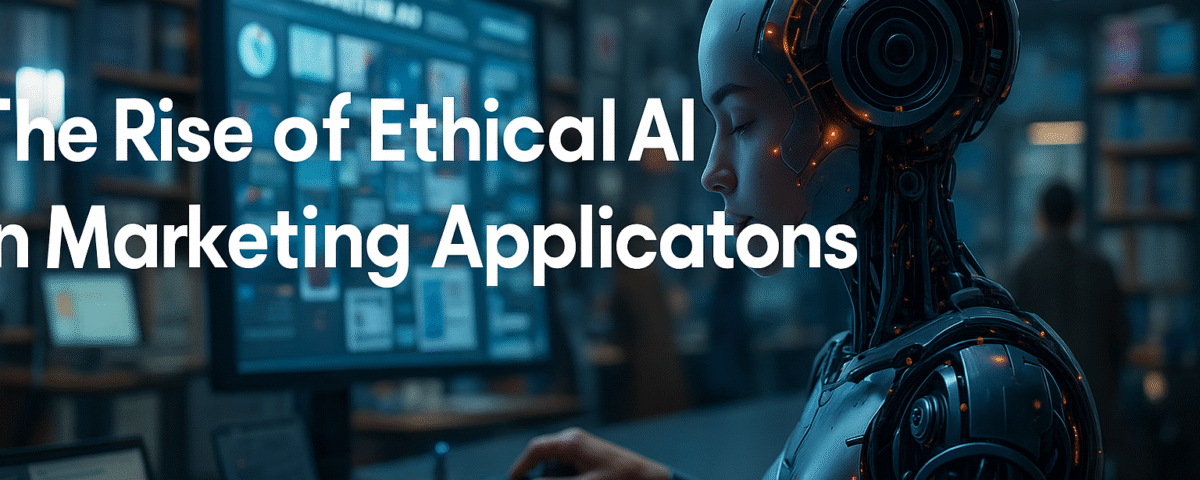
Predicting Consumer Behavior with AI-Powered Tools
April 17, 2025
AI for Sustainable Marketing Practices
April 22, 2025Introduction
The integration of artificial intelligence (AI) into marketing has revolutionized how businesses engage with consumers, streamline operations, and analyze data. From personalized product recommendations to automated customer service, AI’s role in marketing is rapidly expanding. However, as these technologies become more advanced, they also raise serious ethical concerns regarding data privacy, bias, transparency, and accountability. This article explores the growing importance of ethical AI in marketing, why it matters, and how companies can implement responsible practices to maintain consumer trust and regulatory compliance.
Understanding Ethical AI
Ethical AI refers to the development and deployment of artificial intelligence systems in a way that aligns with human values, legal standards, and moral principles. In marketing, this involves creating AI tools that prioritize transparency, fairness, privacy, and accountability. These principles ensure that AI systems do not exploit consumers or reinforce harmful stereotypes. Ethical AI seeks to empower users, promote inclusivity, and prevent unintended consequences stemming from automated decisions.
The Current Landscape of AI in Marketing
AI is already deeply embedded in many marketing functions. Companies use AI-powered tools for customer segmentation, predictive analytics, content creation, sentiment analysis, and chatbot-driven customer service. While these applications enhance efficiency and personalization, they also pose ethical risks. Algorithms can unintentionally perpetuate biases, violate privacy norms, or mislead consumers through opaque decision-making processes. The challenge is to harness the power of AI without compromising ethical standards.
Consumer Trust and Data Privacy
Trust is a cornerstone of successful marketing, and AI must be wielded responsibly to maintain it. Consumer data fuels AI models, making privacy a critical concern. Regulations like the General Data Protection Regulation (GDPR) in Europe and the California Consumer Privacy Act (CCPA) in the U.S. have established stringent rules about data collection and use. Marketers must obtain clear user consent, be transparent about data usage, and provide options for opting out. Ethical data practices not only comply with legal requirements but also enhance customer loyalty and brand reputation.

Bias in AI Algorithms
AI systems learn from historical data, which often reflects existing societal biases. If unchecked, these biases can be amplified in AI-generated marketing strategies, leading to discriminatory outcomes. For instance, an AI tool might disproportionately exclude certain demographics from ad targeting based on skewed data. Addressing bias involves auditing algorithms regularly, using diverse training data, and involving interdisciplinary teams to evaluate model fairness. By identifying and mitigating bias, marketers can foster more inclusive campaigns.

Transparency and Explainability
A major ethical challenge in AI marketing is the lack of transparency. Consumers are often unaware of how or why an AI system made a decision—be it a product suggestion or a targeted ad. Explainable AI (XAI) addresses this issue by making AI’s decision-making processes more understandable to humans. Tools like LIME (Local Interpretable Model-agnostic Explanations) and SHAP (SHapley Additive exPlanations) help marketers interpret model outputs and provide clarity to users, reinforcing trust and accountability.

The Role of AI Ethics Committees
As AI usage grows, many organizations are establishing internal AI ethics committees to oversee the development and deployment of ethical AI solutions. These committees, often comprising legal experts, ethicists, technologists, and marketers, ensure that AI projects align with ethical standards. They assess risk, review policies, and guide best practices. Leading companies like Google and Microsoft have implemented such governance structures to promote responsible AI innovation.

Responsible Personalization in Marketing
AI excels at personalization, but when taken too far, it can feel invasive. Responsible personalization involves balancing customization with user comfort. Ethical marketers focus on consent-based targeting, avoiding overly intrusive tactics like hyper-specific ads that use personal data without permission. Successful examples include platforms that allow users to adjust personalization settings or opt out entirely. This approach respects autonomy and builds long-term customer relationships.

AI and Content Creation
AI tools like GPT and other language models are increasingly used to generate blogs, social media posts, and product descriptions. While this streamlines content production, it raises concerns about misinformation, authenticity, and originality. Ethical content generation involves transparency about AI involvement, human oversight, and adherence to editorial standards. Companies must ensure that content remains truthful, relevant, and aligned with brand values.

Sustainability and AI in Marketing
The environmental impact of AI is an emerging ethical concern. Training large AI models consumes significant computational resources and energy. Marketers using AI must consider sustainability by opting for energy-efficient algorithms, utilizing cloud providers with green energy commitments, and minimizing unnecessary data processing. Aligning AI usage with sustainability goals not only reduces carbon footprints but also appeals to environmentally conscious consumers.
Industry Leaders Promoting Ethical AI
Several companies are leading the charge in ethical AI marketing. IBM, Salesforce, and Adobe have launched initiatives focusing on ethical AI use, transparency, and diversity. These companies provide toolkits, ethical guidelines, and certification programs to encourage responsible practices across the industry. Their efforts set benchmarks and inspire smaller firms to follow suit.

Future Trends in Ethical AI Marketing
The future of ethical AI in marketing is likely to include increased regulatory scrutiny, greater emphasis on algorithmic transparency, and more robust ethical training for marketing professionals. Emerging technologies like federated learning and differential privacy will enable more secure and private data analysis. In the coming years, brands that proactively adopt ethical AI practices will differentiate themselves and gain competitive advantages.

Implementing Ethical AI Strategies in Marketing Teams
To successfully integrate ethical AI, marketing teams need to prioritize education and collaboration. Training sessions on AI ethics, inclusive design, and data governance can empower employees to make informed decisions. Cross-functional teams that include ethicists, legal advisors, and AI experts can guide implementation. Regular ethical reviews and feedback loops further ensure that AI initiatives remain aligned with values and objectives.
Challenges and Opportunities
While implementing ethical AI is challenging—due to limited expertise, evolving standards, and internal resistance—it also presents opportunities. Brands can stand out by being transparent, responsible, and consumer-centric. Ethical AI not only mitigates legal risks but also enhances brand equity and fosters customer loyalty.
Conclusion
Ethical AI is no longer optional in the world of marketing. As artificial intelligence continues to reshape how brands interact with consumers, businesses must prioritize fairness, transparency, privacy, and accountability. By embracing ethical AI practices, marketers can build trust, comply with regulations, and lead their industries into a more responsible digital future.


